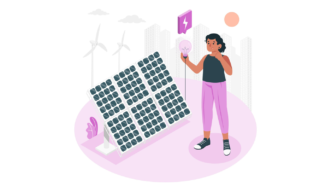LESSON OVERVIEW
This lesson plan on saving the planet deals with plogging, i.e. the idea of picking up litter while jogging. The worksheet consists of a few vocab exercises and includes a lot of words used for talking about waste and littering.
B2 / Upper Intermediate60 minFlipped LessonUnlimited Plan
This is a Flipped Classroom lesson plan. In a nutshell, it means that the first part of the lesson needs to be done by students at home. Learn more about flipped classroom and how we implement it in these lesson plans in our post.
PRE‐CLASS ACTIVITIES
In the pre‐class part, students will revise vocabulary that we use when talking about waste. First, they need to answer a few questions using the words in the box. The list includes words such as biodegradable, dumpster, garbage, garbage bins, litter bins, single-use, trash, etc. Students get both American and British English equivalents as we want to show them different words used depending on a dialect. To practise the words more, students have to complete a few sentences with the words from the previous exercise.
IN‐CLASS ACTIVITIES
Video & Discussion
The in‐class worksheet starts with a short discussion about sorting trash as well as the problem of littering in cities. Next, we ask students whether they have ever heard about plogging and watch a short video in which a speaker explains the term. After watching it, in their own words, students need to explain what ‘plogging’ is. Then, they move to the second task and complete a few sentences with one word only. After that, they watch the video again and check their answers.
Verbs phrases with prepositions
The video is full of verb phrases with prepositions which are worth teaching. First, students have to match halves to create 8 phrases. Next, they use the phrases to complete some sentences. Sometimes they will need to change the form of the verbs. After this task, students discuss a few questions connected with the video and the idea of plogging. Encourage them to use phrases from the previous exercise (they are also included in the questions). Finally, this lesson plan on saving the planet ends with a couple of statements that students have to discuss using the phrases for agreement/disagreement provided in the box. The statements touch upon plogging, recycling and the environmental crisis.
WORKSHEETS
Subscribe to unlock these and many other Standalone lesson lesson plans with the Unlimited plan
Subscribe












Wow – looks like a lovely lesson plan – I’ll have to subscribe to get this one!!
We hope you like it!
It looks an interesting lesson.
This is a great lesson, and I love giving my students a chance to learn about ecology! One thing though concerning vocabulary. I am an American and we do not call a landfill site a dumpster. That would be ‘the dump’, not a dumpster. A dumpster is a large, rectangular receptacle that you put your trash in. Also, it is much more common in the US to call a trash bin a trash can or garbage can. Great lesson but I could tell it was not written by an American.
Thank you for your comment!
We have added the word ‘can’ to the worksheets since we overlooked it in the first place.
As for the word ‘dumpster’, we didn’t mean it to be the same as ‘landfill’ but just another place our non-recyclable waste can go to.
I really like this lesson plan and I plan to use it soon. Thanks a lot!
Just one comment: I am not American, but it seems to me that landfill is also used in the USA:
http://www.ecopartnersinc.com/2014/09/22/how-is-a-landfill-different-from-a-dump/
http://www.ecopartnersinc.com/2014/09/22/how-is-a-landfill-different-from-a-dump/
I thought it might be useful to add it to the worksheet for the sake of clarity.
I especially like in this worksheet that it is marked where the different words are used.
Thank you for your comment! We have changed it to ‘landfill’ as it’s used in both British and American English.
A good lesson, thank you! Surprising though that the plogger doesn’t wear gloves when handling the trash.